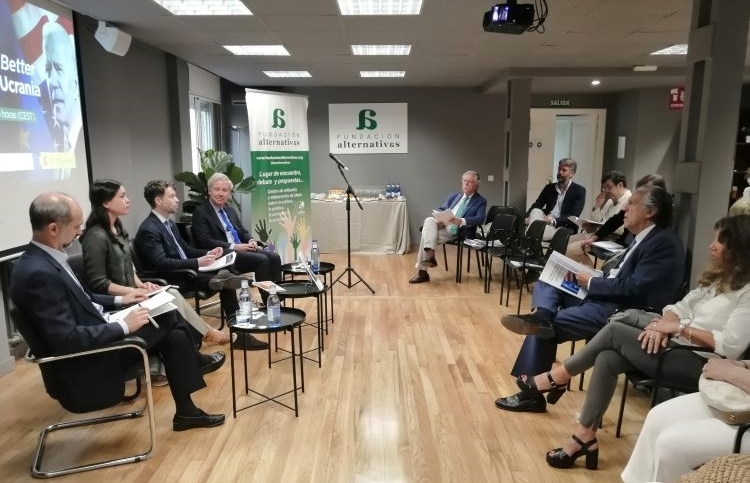Eduardo González
The Alternativas Foundation presented this week the Report 2022 US Trends and their impact on Europe, which addresses some of the main political, social, economic, environmental or technological trends in the US during Joe Biden’s Administration, among which stand out the “strong social and political polarization” that the country is experiencing and the reorientation of its initial “foreign policy for the middle classes” to the needs of Russia’s war in Ukraine.
The 2022 Report focuses on how Biden’s initial plan has evolved when he became President, whose “two fundamental pillars”, both in domestic and international policy, were “the defense of democracy” and the development of “a social, fiscal and environmental pact”, as explained the director of the Foreign Policy Observatory of the Alternativas Foundation, Vicente Palacio, during the presentation of the report, which took place last Tuesday at the headquarters of the think tank in Madrid.
The document shows, in its five chapters, the existence of significant changes and “new trends” in Biden’s presidency since his arrival at the White House in January 2021. The first of these trends, according to Palacio, is “the persistence of a strong social and political polarization that generates serious dysfunctionalities and a scenario of great uncertainty”. In the United States there are “enormous fractures between income levels, minorities, territories and ideologies and a political polarization in Congress, divided as almost never before”, he continued.
In this regard, José María de Areilza Carvajal, Secretary General of the Aspen Institute Spain and Ordinary Professor at ESADE, warned during the colloquium that democracy in the United States “is at its most fragile moment in the last ten years”, with the “prospect of Donald Trump or one of his disciples winning again in a way that is not necessarily lawful, in any way”. “There is a terrible polarization, 60% of Republicans think Biden won with bad arts,” he continued. “There is a clash between two Americas and the November congressional elections are expected to give us more clues in this regard,” he added.
The second trend, Palacio continued, is the “ongoing attempt to fight inequality by the Biden Administration and the Democrats through domestic and international tax reform targeting big fortunes and big corporations.” This “major tax reform, Biden’s great promise when he came to the White House, has not yet been achieved,” which prevents “raising the funds needed to pay for public policies and finance public services, such as health and education,” he said. The third and related trend is “a certain slowdown in the momentum of this fiscal reform, both in the US and globally, as a fundamental means of exiting the crisis, due to internal pressures and a change in the international situation due to the war in Ukraine”.
The fourth trend is marked by “simultaneous developments in the US and the EU for the financing and regulation of the digital economy and technology.” “There is an awareness of the importance of technological and digital sovereignty” and, therefore, “the US is in a frantic race against China to see who wins, while Europe remains in the middle, fighting for positions,” he said. The fifth trend, Palacio explained, is “the continuation of environmental policies inspired by a Green Pact, with new challenges on the way”.
Foreign policy
Undoubtedly, the most relevant trend, in the current international context, is the sixth one, which Palacio defined as “a turn in the so-called foreign policy for the middle class” defended by Biden and the Secretary of State, Antony Blinken, and “based on a social and fiscal agenda, disconnected from war and interventions and with a trade policy oriented to a supply of strategic goods more national than global, in a replica of what happens in Europe, to face cuts in case of crisis or wars”.
However, he added, “we have encountered the war in Ukraine, which we did not expect, and we have had to change the chip and rethink that policy”, which has been reoriented “towards the preeminence of other agendas, mainly security and increasing militarization”. In this regard, Areilza warned that “the US is in a very delicate moment, which can also be seen in its foreign policy strategy”. “The internal weakness conditions the foreign policy towards China, accentuating the most aggressive features”, and, in these circumstances, Ukraine has become “the great distraction of its strategy, which is in the Pacific and in China”, he added.
The event was also attended by Miguel Ángel Aguilar, president of the Carlos de Amberes Foundation and secretary general of the Association of European Journalists; Raquel Carretero Juárez, head of Communications and the Digital Public Policy Area of Telefónica S.A.; Beatriz Camacho Ávila, director of Ecosystem for Southern Europe, RIS-EIT Climate-KIC; José Luis Escario, consultant and professor in international taxation; and Ignacio González, economist and professor at American University (Washington DC).





